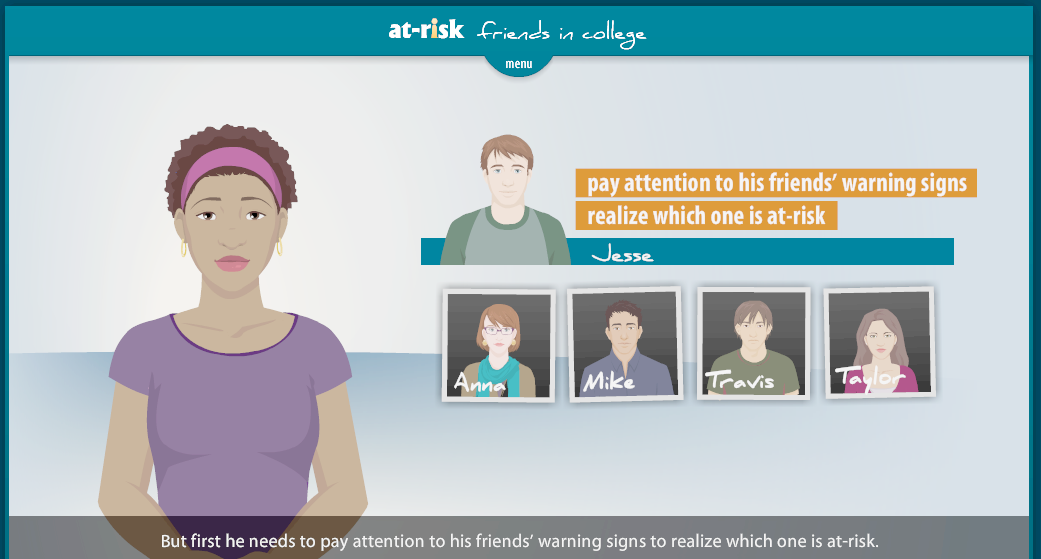You are an Avatar named Jesse. Throughout the day, you walk around campus, encountering four friends and discovering their various emotional issues.
After a series of social situations, you are put to the test. Should you be concerned about your friends? How do you approach them? What resources are available at your college to help them?
All three questions are answered in the new virtual suicide prevention simulation made available to College of William and Mary students March 26. The simulation is designed to help students recognize their peers’ problems before a situation becomes unmanageable or dangerous.
You have the lead role in the suicide prevention program, “At Risk: Friends in College,” accessed through the Kognito website under the Office of Health Education link on Wm.edu.
“Mental health issues and suicide prevention in particular really require that we take a multidimensional approach,” Vice President for Student Affairs Ginger Ambler ’88 Ph.D. ’06 said.
Ambler cited suicide as the second leading cause of death among all college students in a campus-wide email.
“Prevention is really critical because there is so much we can do if we can intervene with the students early,” Ambler said. “The truth is we are all in a position to help one another.”
The 30-minute simulation takes you through a series of social situations in which a guide tells you how your interactions are received by the other avatars. The simulation aims to help students recognize warning signs in friends’s behavior, how to talk to them if their behavior becomes concerning, and where to find resources on campus.
“[In the program,] there are situations that aren’t uncommon,” Ambler said. “You can see then how you would put yourself into a helping mode in a variety of interactions with people on campus.”
While this program focuses on peer-to-peer prevention, a similar program was purchased for faculty and staff a year ago. After the College received a donation from the McGlade family toward health education, administrators decided to purchase the program for students.
“Last year, we highlighted a similar module that was designed specifically for the staff to do the same sort of thing to help faculty see signs of students that might be in emotional distress,” Ambler said. “Anecdotally, the feedback was very positive. The situations presented were very realistic.”
Research from the company who created the program indicated a significant increase in self-motivated student prevention upon completion of the course. In a program assessment survey taken by 512 students from 35 universities, 82 percent of students said they are likely or very likely to approach and refer a fellow student who is exhibiting signs of psychological distress after completing the module.
“Research tells us that students are most likely to turn to friends and roommates when they are having trouble, so it makes sense that our prevention efforts would target the very people to whom students turn most often,” Ambler said.
David Alpert ’13 completed the module after receiving Ambler’s email. Alpert felt that the portrayal of mental health issues in the program was realistic.
“It stresses the fact that mental health is on a continuum,” Alpert said. “It’s not like you are either seriously ill or completely healthy, but college throws a bunch of different challenges and situations at us, and it is up to us to not only keep ourselves in check but to also look out for the members of our community.”
This preventive measure is one of various programs established at the College designed to promote mental health and address mental health problems among students.
“This program is a part of the plan for risk reduction and serves as a complement to other programs and resources on campus such as counseling, peer education and extended orientation,” Graduate Assistant for the Office of Health Education and Dean of Students Office Justin Jackson said.
In order to make sure the program would be effective before purchasing the year-long license, the Office of Health Education evaluated the program beforehand.
“Several staff members in Student Affairs and a number of Health Outreach Peer Educators pilot-tested the program over the summer and in the beginning of the fall semester, strongly endorsing the program,” Jackson said.
The program will be available to students for a year. Additionally, students who complete the computer simulation program before April 15 will be automatically entered in a drawing for a Playstation 3.
“The most important thing is to raise awareness and reduce negative stigma to seek help,” Ambler said. “We want anyone on campus to feel empowered to step in so that a person can receive the help he or she needs.”





























